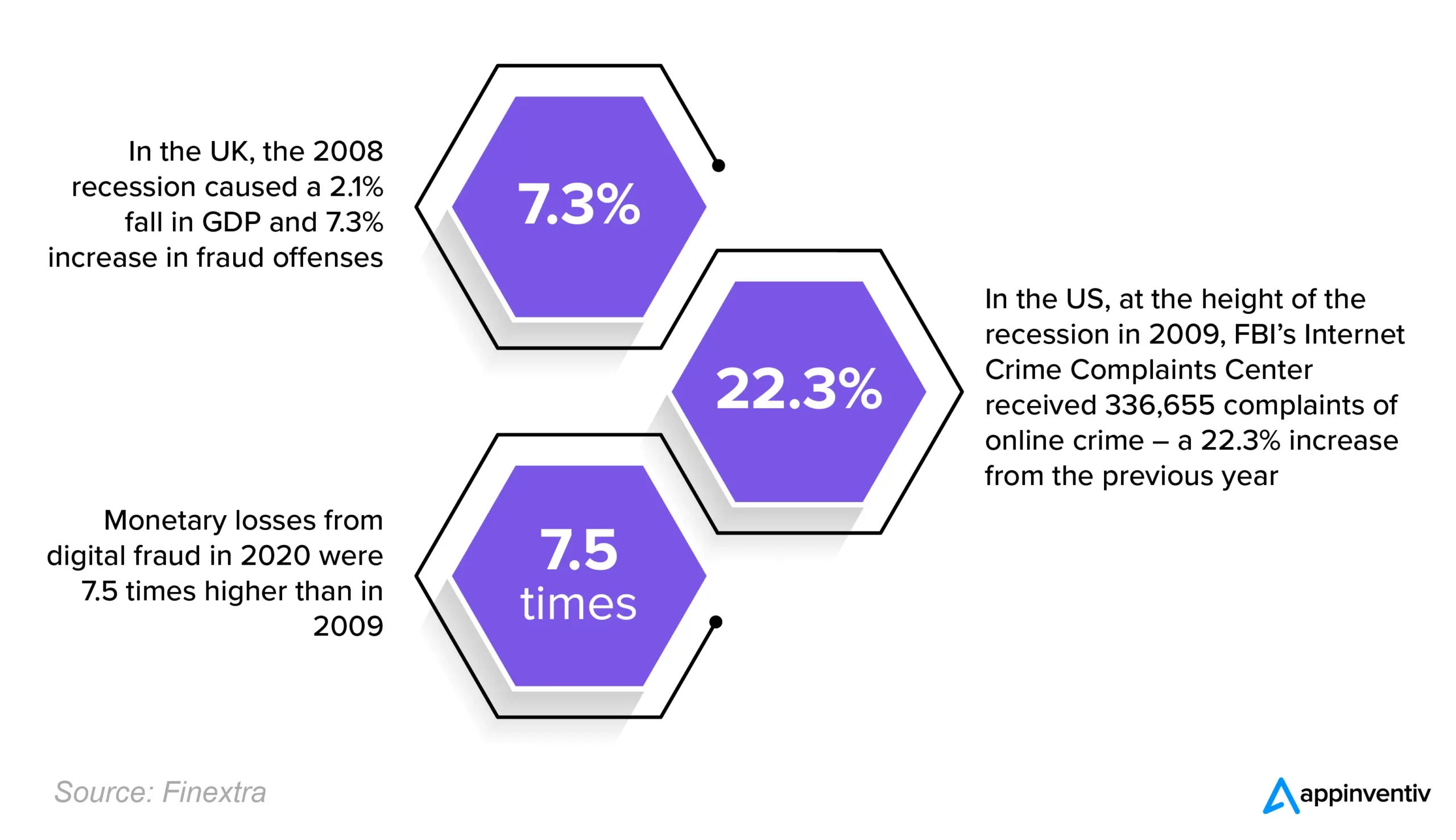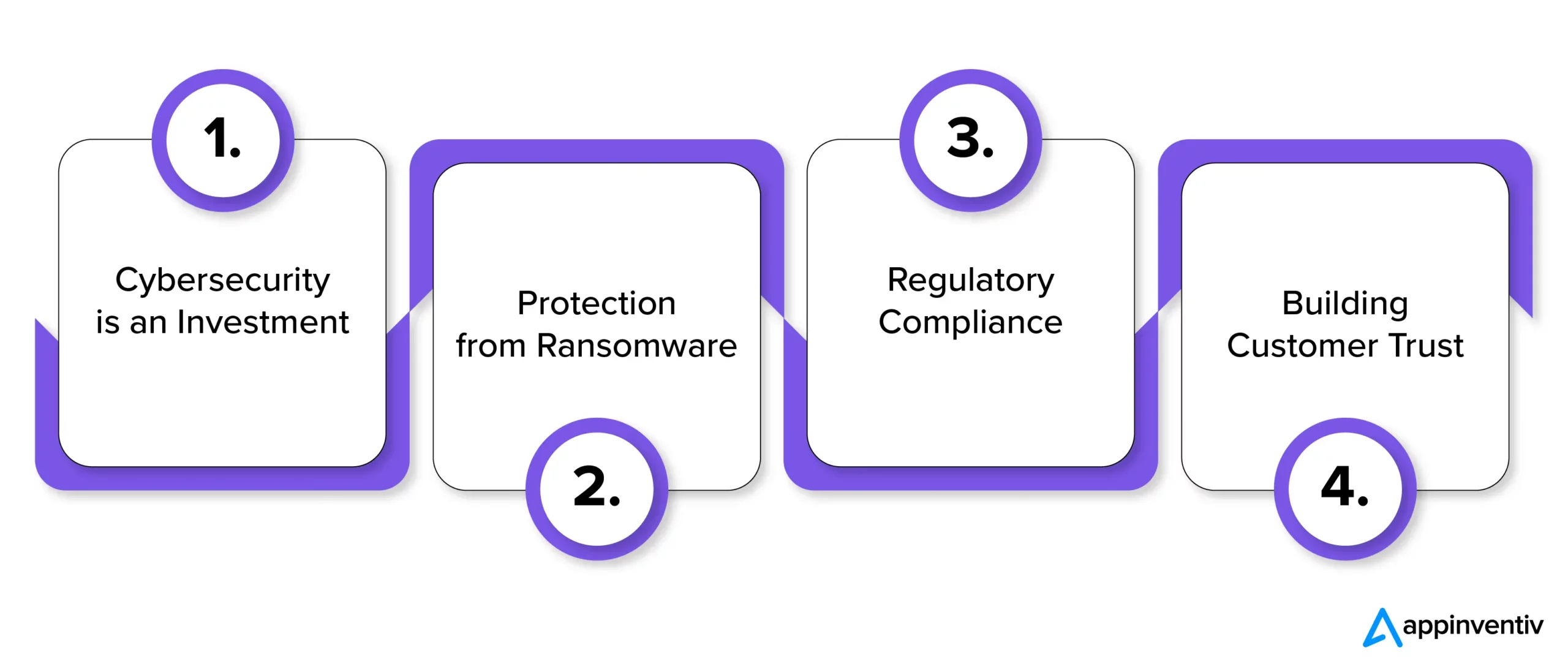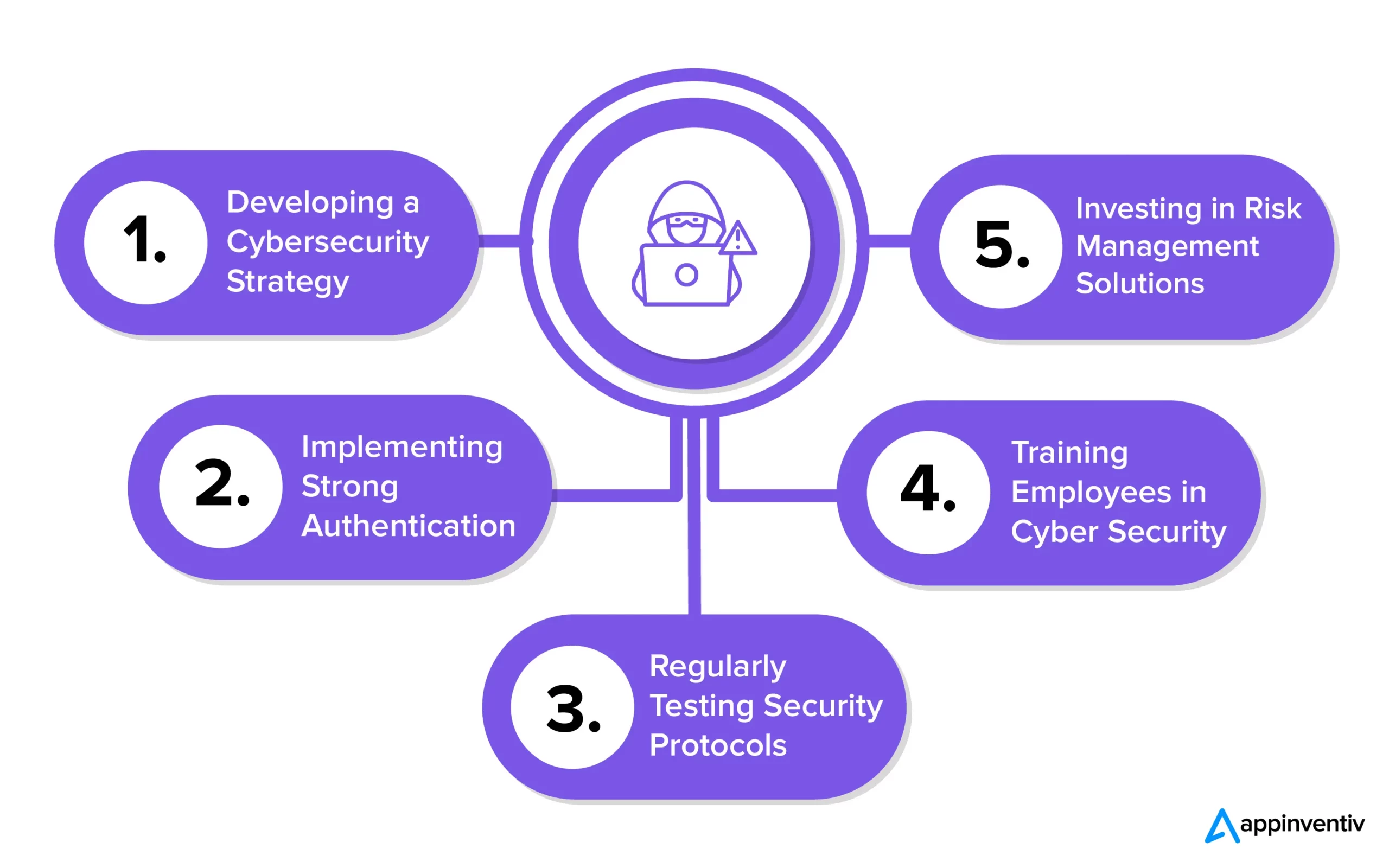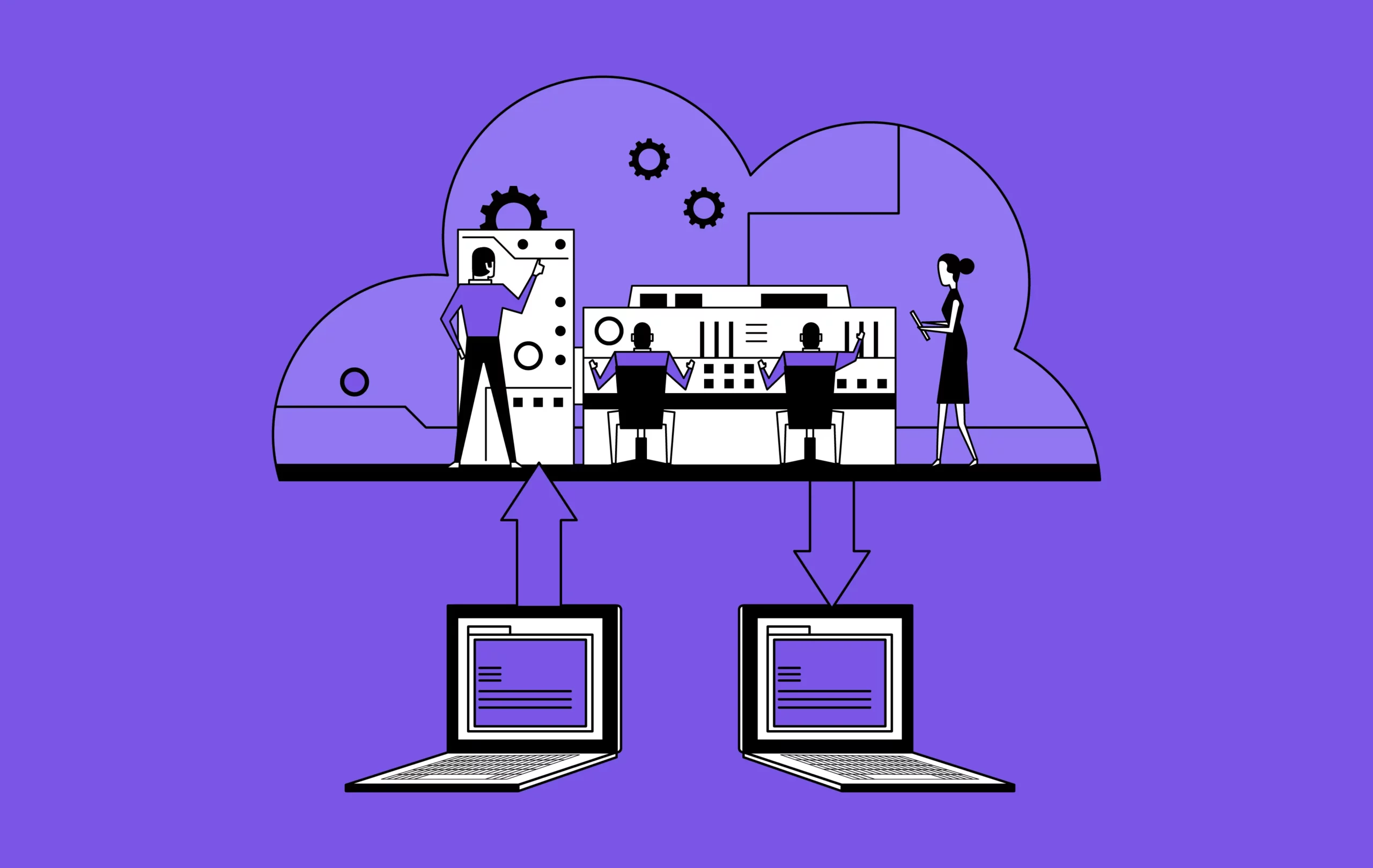- The increase of cybercrimes during recessions - Why & how they happen
- 1. Lack of resources:
- 2. Financial motivations:
- 3. Widespread unemployment:
- 4. Lack of public awareness:
- During recessions, it's ok to cut costs, but not on cybersecurity
- Cybersecurity is an Investment
- Protection from Ransomware
- Regulatory Compliance
- Building Customer Trust
- How can organizations keep their business protected from cybercrime?
- 1. Developing a Cybersecurity Strategy:
- 2. Implementing Strong Authentication:
- 3. Regularly Testing Security Protocols:
- 4. Training Employees in Cyber Security:
- 5. Investing in Risk Management Solutions:
- What is the role of the cloud in managing cybersecurity?
- 1. Flexibility:
- 2. Cost savings:
- 3. Scalability:
- 4. Remote accessibility:
- 5. Security:
- How Appinventiv can help businesses make robust and secure software products
It’s no secret that recessions have hit the United States hard time and time again. With the current economic downturn, US companies face unprecedented financial challenges. As a result, company owners and executives need to find ways to recession-proof their business to survive this downturn.
Through years of trial and error, US companies have learned much about managing their businesses through economic hardships best. One of the most critical steps for any company is keeping up-to-date on emerging and current cybersecurity trends and ensuring that cybersecurity protocols are in place to protect all data and assets from cyber-attacks, which could be devastating during this time of financial fragility.
This task can be done with others, however. Companies can identify and contract with reliable IT and cloud consulting service providers who can prioritize their cybersecurity protocols and needs.
In this article, we’ll dive into everything you need to know about risk management, managing cybersecurity for businesses, and emerging trends in cybercrime and cybersecurity during recession.
Now, let’s start by looking at the increasing instances of cybercrime on businesses during recession. Let’s dive in!
The increase of cybercrimes during recessions – Why & how they happen
- In the UK, the 2008 recession caused a 2.1% fall in GDP and 7.3% increase in fraud offenses
- In the US, at the height of the recession in 2009, FBI’s Internet Crime Complaints Center received 336,655 complaints of online crime – a 22.3% increase from the previous year
- Monetary losses from digital fraud in 2020 were 7.5 times higher than in 2009

A reactive approach to managing cybersecurity for businesses is typically the main culprit of why cyberattacks happen during any time of economic hardship. When a company is under financial strain, it can be challenging to allocate resources for proactive cybersecurity measures, leaving the businesses at fraud risk during a recession.
When money is tight, companies tend to focus on keeping the business afloat rather than investing in proactive cybersecurity for business measures such as encrypting data or having risk management protocols. As a result, cybersecurity recession measures are often overlooked.
Let’s take a closer look at some more reasons why cybersecurity recession problems often increase:
1. Lack of resources:
It may seem counterintuitive, but a lack of resources is one of the main reasons cybersecurity recession issues often arise.
As mentioned before, companies often don’t have enough money to invest in proactive cybersecurity measures such as encrypting data, updating systems regularly, and having risk management protocols. If they do, it’s typically not taken advantage of until it’s too late.
2. Financial motivations:
What do people need most during a recession? Money. Unfortunately, criminals are often motivated by money, and a recession is the perfect opportunity for them to take advantage of vulnerable businesses.
3. Widespread unemployment:
During a recession, unemployment can be at an all-time high. This is bad news for businesses, as it increases the likelihood of malicious actors using stolen identities to apply for loans and other financial relief programs intended to support small businesses.
For example, during the COVID-19 pandemic, criminals applied for Paycheck Protection Program (PPP) loans, the Economic Injury Disaster Loan (EIDL) and other emergency relief programs intended to help struggling small businesses.
These criminals took advantage of the widespread unemployment situation by stealing identities and falsifying their own personal information to gain access to much-needed funds which were intended for legitimate business owners.
4. Lack of public awareness:
Unfortunately, only some people are aware of the risks involved with cybercrime and the importance of cybersecurity in business during a recession. Most people don’t understand how their personal information can be used by malicious actors to commit fraud or theft.
This lack of knowledge leaves them vulnerable to attack and creates an even more significant opportunity for cybercriminals to take advantage of unsuspecting individuals.
During recessions, it’s ok to cut costs, but not on cybersecurity
Why is cybersecurity critical to businesses? Here are four big pointers on how the importance of cybersecurity for businesses can never be overstated, even during recessions.

Cybersecurity is an Investment
Cybersecurity strategies are an investment in the security and stability of your business. Taking the necessary steps to protect against cybercrimes can save you from huge losses that could jeopardize your company’s future. Investing in reliable encryption software, antivirus protection, secure networks, data backups, strong passwords, and personnel training are all essential for keeping a business safe from malicious attacks.
Protection from Ransomware
Ransomware is one of the fastest-growing forms of cyberattack, and it can have devastating effects on a company’s operations and financial health.
In fact, the first half of 2021 saw $590 million in ransom payments. This is an incredibly large amount that could have been saved with the right cybersecurity strategies in place. Investing in reliable antivirus software, employee training on phishing, and data encryption are all essential to protect a business from ransomware attacks.
Regulatory Compliance
Being compliant with data security regulations is essential for any business that handles customer or employee information. Not only can large fines be issued for non-compliance, but companies that do not meet regulatory requirements may also suffer reputational damage and lose the trust of their customers. Investing in cybersecurity services during recession through strategies, tools and personnel training will help ensure your business meets the necessary standards to avoid hefty penalties from regulators
Building Customer Trust
Customers want to feel secure when making a transaction from your platform. Investing in cybersecurity in a down economy will help to build confidence that their data is being protected, and that your business takes security seriously. Implementing measures such as multi-factor authentication, access controls, and strong passwords can give customers peace of mind that their information is safe.
By now, you must have got a clear answer to how cybersecurity affects businesses. So, it’s now time to look at the steps that can actually help you keep your business safe from cybercrime during recession.
How can organizations keep their business protected from cybercrime?
How can your company ensure that your business and customer data are kept safe from cybercrime attacks? Follow these five steps:

1. Developing a Cybersecurity Strategy:
The first step to protecting your business from cybercrime is to create effective cybersecurity strategies. This should include formal policies and procedures for identifying and responding to potential threats, as well as guidance on how best to protect the company’s data and systems.
Your strategy should also outline roles and responsibilities when it comes to managing cybersecurity for businesses during a recession.
2. Implementing Strong Authentication:
Strong authentication measures such as two-factor or multi-factor authentication can help make sure that only authorized personnel have access to sensitive data or systems. Setting up strong passwords with a combination of upper/lowercase letters, numbers, and symbols is also essential for keeping systems secure from unauthorized access.
Consider incorporating biometric authentication for accessing critical systems or data. This will help ensure that only authorized personnel can access the system, adding an extra layer of security.
3. Regularly Testing Security Protocols:
Performing regular security tests is an essential cybersecurity tip during recession that can keep your business safe from cybercrime. This involves using automated tools to scan systems and networks for any potential vulnerabilities that could be exploited by hackers or malicious actors.
These scans should be performed regularly, such as monthly or quarterly, to ensure that all necessary patches and updates are in place and that any newly discovered threats are dealt with quickly.
4. Training Employees in Cyber Security:
Often, employees can unknowingly leave the business vulnerable to attack by not following security protocols or simply being unaware of potential risks. To prevent this, it’s essential to invest in training and awareness programs for all staff members so they are familiar with the current security protocols and know how best to protect their systems from attacks.
Some programs even offer simulated phishing tests and exercises to help employees understand cybersecurity strategies better.
Also read: Digital Immune System – How it Shields Your Business Against Cyber Attacks
5. Investing in Risk Management Solutions:
Organizations should invest in solutions that provide advanced analytics to identify potential threats and malicious activities.
These solutions should be able to scan networks for any suspicious activity, alert the business if necessary, and provide a detailed analysis of what happened and how best to respond. Placing emphasis on this kind of proactive monitoring will help keep your business ahead of attackers by allowing you to monitor their behavior before they have a chance to do any damage.
[Also Read: How to Automate your Enterprise Cybersecurity with AI powered SOC]
What is the role of the cloud in managing cybersecurity?
The role of the cloud in managing cybersecurity has become increasingly important as more businesses move their data and other services to the cloud.
The main concern among executives regarding securing data within the cloud is that they don’t have full control over the cloud environment or that it is too difficult to monitor. Fortunately, cloud providers offer numerous security services and options that can help protect your data in the cloud.
These include encryption at rest and in transit, authentication protocols, access control lists (ACLs), firewalls, intrusion detection systems (IDS), and virtual private networks (VPNs).
By using these tools alongside best practices for managing cybersecurity during recession, such as user education and training, patch management, incident response plans, and regular testing of system vulnerabilities, businesses can greatly reduce the risk of a successful cyber attack on their systems. Therefore it is important for organizations to take advantage of the cloud’s features to ensure they have holistic protection from any potential risks posed by malicious actors.
Here are some additional reasons why the cloud is an important tool for managing cybersecurity in recession over traditional on-premise solutions:
1. Flexibility:
Cloud solutions allow businesses to quickly adjust their IT infrastructure and security protocols depending on changes in the external environment, making them more agile than traditional solutions. This is especially important during a recession when cyber threats are more common due to increased economic uncertainty and financial pressures on individuals and businesses.
2. Cost savings:
Cloud solutions can help businesses save money compared to traditional security solutions as they require less hardware, software, and personnel resources for implementation. Additionally, cloud solutions offer scalability, which allows companies flexibility in terms of the number of users or devices that need protection at any given time.
3. Scalability:
Cloud solutions are designed for rapid expansion and can be easily scaled up or down depending on the needs of the business. This is especially helpful when businesses experience sudden growth in their operations, as they don’t need to purchase additional hardware or software to keep up with demand.
4. Remote accessibility:
A vast majority of businesses have employees working remotely, which makes it difficult to ensure secure access to corporate networks and data. Cloud solutions can help alleviate this problem by providing secure access to remote users through their own devices or from any location. This enables organizations to maintain continuity of operations during times when physical access is not possible.
5. Security:
Unlike traditional security solutions, cloud-based solutions are designed with advanced threat protection measures in place. Even business bank accounts can be securely accessed through cloud-based banking services.
These include firewalls, encryption protocols, malware scanning, two-factor authentication and more. Additionally, cloud providers are constantly monitoring their services for any suspicious activities or threats that could potentially compromise the data of their customers.
[Also Read: Defying Economic Downturns: The Success of Companies Founded During Recession]
How Appinventiv can help businesses make robust and secure software products
In a world where cyber security threats are constantly evolving, businesses need to invest in robust and secure software solutions that can protect their data from attack.
Appinventiv is a professional software development and cloud consulting services company that specializes in providing custom-made software solutions tailored to the needs of each customer. We leverage our extensive experience in developing cloud-based applications and security protocols to provide innovative solutions that meet the ever-changing demands of the digital age.
Our team of certified professionals uses best practices, advanced threat protection measures, encryption protocols, malware scanning capabilities, and more to ensure your business’s data remains safe at all times. We also offer flexible scalability options to quickly expand or reduce your solution depending on demand. Additionally, our remote access feature allows users to access corporate networks.
If you are looking for secure software solutions to ensure complete cybersecurity during recession, contact us today and see how Appinventiv can help you create reliable and robust products for your business. We look forward to helping you protect valuable data from cyber threats.


Excellence Together

Is a Cloud-Native Application Protection Platform (CNAPP) the Answer to Security Woes?
Cloud computing, at the back of its wide-ranged benefits spanning across scalability, high mobility, easy data recovery, high performance, and quick deployment, has come at a stage where the market is set to reach $676 billion in 2024. While on one side, the idea of having on-cloud presence is becoming mainstream, the other side -…

On-premise vs. cloud - Analyzing the benefits, risks and costs for enterprises
Are you standing at the crossroads of a technological revolution, pondering the question that's on every modern enterprise's mind: on-premise vs. cloud? The stakes are higher than ever. With the global cloud computing market poised to soar to an astonishing $2.3 trillion by 2032, the future seems to be whispering its secret preference. Yet, the…








